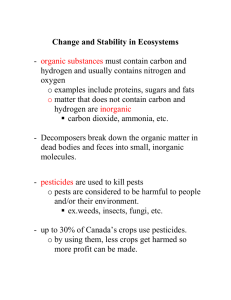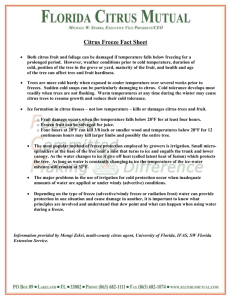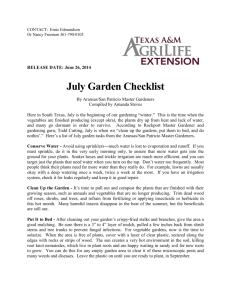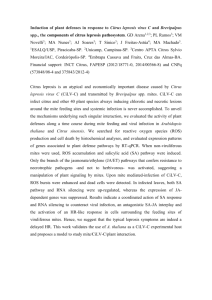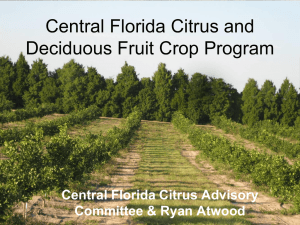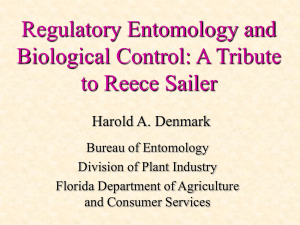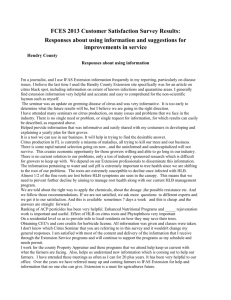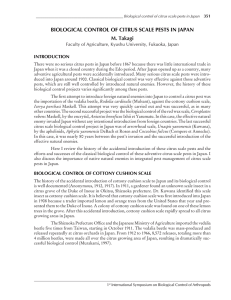Citrus Pest Control - Nassau County Extension
advertisement
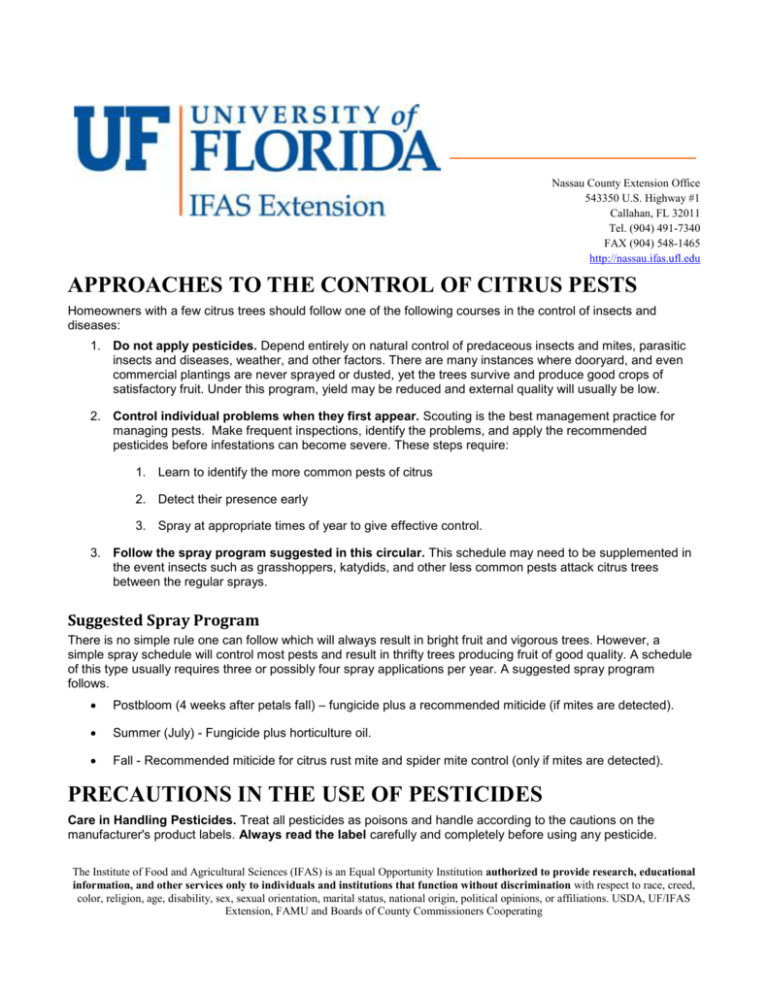
___________________________________________________________________________ __ Nassau County Extension Office 543350 U.S. Highway #1 Callahan, FL 32011 Tel. (904) 491-7340 FAX (904) 548-1465 http://nassau.ifas.ufl.edu APPROACHES TO THE CONTROL OF CITRUS PESTS Homeowners with a few citrus trees should follow one of the following courses in the control of insects and diseases: 1. Do not apply pesticides. Depend entirely on natural control of predaceous insects and mites, parasitic insects and diseases, weather, and other factors. There are many instances where dooryard, and even commercial plantings are never sprayed or dusted, yet the trees survive and produce good crops of satisfactory fruit. Under this program, yield may be reduced and external quality will usually be low. 2. Control individual problems when they first appear. Scouting is the best management practice for managing pests. Make frequent inspections, identify the problems, and apply the recommended pesticides before infestations can become severe. These steps require: 1. Learn to identify the more common pests of citrus 2. Detect their presence early 3. Spray at appropriate times of year to give effective control. 3. Follow the spray program suggested in this circular. This schedule may need to be supplemented in the event insects such as grasshoppers, katydids, and other less common pests attack citrus trees between the regular sprays. Suggested Spray Program There is no simple rule one can follow which will always result in bright fruit and vigorous trees. However, a simple spray schedule will control most pests and result in thrifty trees producing fruit of good quality. A schedule of this type usually requires three or possibly four spray applications per year. A suggested spray program follows. Postbloom (4 weeks after petals fall) – fungicide plus a recommended miticide (if mites are detected). Summer (July) - Fungicide plus horticulture oil. Fall - Recommended miticide for citrus rust mite and spider mite control (only if mites are detected). PRECAUTIONS IN THE USE OF PESTICIDES Care in Handling Pesticides. Treat all pesticides as poisons and handle according to the cautions on the manufacturer's product labels. Always read the label carefully and completely before using any pesticide. The Institute of Food and Agricultural Sciences (IFAS) is an Equal Opportunity Institution authorized to provide research, educational information, and other services only to individuals and institutions that function without discrimination with respect to race, creed, color, religion, age, disability, sex, sexual orientation, marital status, national origin, political opinions, or affiliations. USDA, UF/IFAS Extension, FAMU and Boards of County Commissioners Cooperating Pesticide Residues. Citrus consumed by the producer should be prepared by the generally accepted practices of washing, peeling, etc. Dooryard fruit offered for sale must conform to federal and/or state food and drug pesticide residue regulations. Oil Emulsion Sprays/Insecticidal soaps. Use an ultra-fine oil as this can be used year round. Avoid spraying trees during the heat of the day; instead apply in the morning or early evening hours. Do not mix oil with sulfur. Apply oil and sulfur separately; allowing at least a three-week interval between applications, or injury to fruit and foliage may result. Herbicides (weed killers). If a weed killer is used, be sure it is not used close enough to citrus to result in residues in the fruit; or be sure it is approved for use around citrus trees. Household Sprays. Several homeowners have made the mistake of spraying citrus trees and other plants with sprays formulated specifically for use inside homes to control household pests. These sprays, in general, have the insecticide dissolved in some type of petroleum solvent such as refined (deodorized) kerosene and should not be applied to plants because injury to the plants usually results. Avoid using degreasing detergents and oils formulated for cleaning furniture. Dooryard Citrus Pest Control Chart. Material1 Ultrafine Horticulture Oil Pests Controlled Whiteflies, spider mites, greasy spot, greasy spot, loosens sooty mold, and psyllids Insecticidal soap Scale, whiteflies, greasy spot, loosens sooty mold, and psyllids. Malathion/Sevin Scale, aphids, whiteflies, grasshoppers & katydids Fungicide sprays (including copper sulfate) Greasy spot, scab, and melanose Remarks Does not control snow scale. Do not apply if trees are wilting. Do not apply within 3 weeks of sulfur. See comments under scale pests. Does not control chaff scale. Use with caution – can kill beneficial insects. 1. Apply before new growth starts in the spring and when 2/3 of petals have fallen. 2. Apply spray thoroughly to young fruit, 4 weeks after the flowers shed. 3. July. Sprays of copper may blacken existing corky areas of the rinds, but this will not affect eating quality. 4. Be sure to alternate the types of fungicides used as a resistance can easily occur if pesticides are not rotated. 1Read label thoroughly; follow label directions for mixing and application rates. The Institute of Food and Agricultural Sciences (IFAS) is an Equal Opportunity Institution authorized to provide research, educational information, and other services only to individuals and institutions that function without discrimination with respect to race, creed, color, religion, age, disability, sex, sexual orientation, marital status, national origin, political opinions, or affiliations. USDA, UF/IFAS Extension, FAMU and Boards of County Commissioners Cooperating
